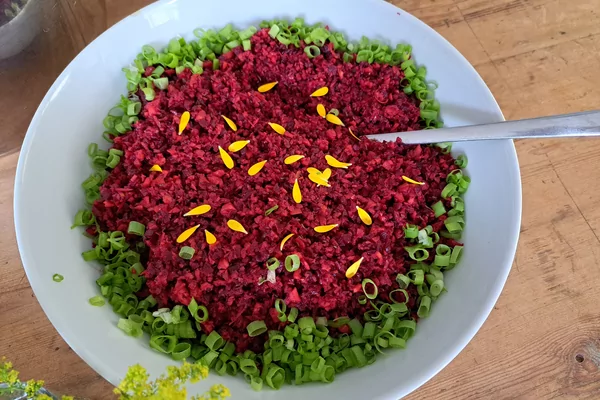How do you know when you are hungry? Does your tummy rumble? Do you feel weak? Does the clock say you should be hungry?
Are you hungry because you have seen or smelled something you would like to eat? Do you need a distraction? Is your mouth looking for some activity?
What is hunger?
There are many types of hunger. Breaking them down can help in understanding ourselves and why and how we eat.
1. eye hunger
The dessert tray looks good when you have already had a big meal… Pictures outside of a fast food chain bring you in…
There is a saying ‘my eyes were bigger than my belly’.
Feed your eye hunger: serving food beautifully on a plate, use smaller dishes, use colours and make food look fantastic. You can even light a candle or put flowers on the table, and take a moment to look around you.
2. nose hunger
The smell of baking bread or freshly roasted coffee… a very primitive mechanism to know what is good to eat and what to avoid… but nowadays we are bombarded with smells to tempt.
Feed your nose hunger: smell your food before you eat it, a large part of flavour is due to smell so drink it in.
3. mouth hunger
The mouth desires pleasurable sensations – it is part of our survival mechanism. We are all different and our mouth can be trained to like more or less sweet, salty, bitter, spicy or acidic foods. Our traditions and genetics, as well as habits, influence this.
Feed your mouth hunger: prepare foods that delight your mouth – different textures and flavours. Be aware though that the mouth can often be thirsty and not hungry. It also loves to be full, so take your time to chew your food well.
4. stomach hunger
Do you have an empty feeling or grinding sensation? Is this a sensation you like or you do everything to avoid?
Our stomach is easily conditioned - those who don’t eat breakfast say they are not hungry at that time of day – those who do eat it say they are. Continual grazers will often feel the stomach needs to be filled.
Those who eat 3 times a day will get demands at those times. Fast a few days and the stomach will start to be quiet… it is conditioned for our survival. However be careful, the stomach also signals anxiety in a similar way.
Feed your stomach hunger: Listen to your stomach - when does the stomach signal hunger? What does it feel like? When does it feel empty, pleasantly full, overfull? Satisfy stomach hunger with the right amount of foods that make you feel good.
5. cellular hunger
A baby or small child has the wisdom to know what they need and when had enough. Sadly as we get older we override this wisdom so often that we can’t hear it. Bodies are amazing machines that do so much to keep as healthy as possible. Cravings are our body’s way to speak to us – and they are important signals to listen to.
Feed cellular hunger: when you go shopping or before you cook, look at what possibilities you have and see what the body is asking for. Perhaps green leaves, pulses, grains, seeds… chocolate! Slowly try and tune into your body’s "radio station". Slow down, breathe, take a moment…
6. mind hunger
Our mind usually speaks in ‘shoulds’… it gives us the shudders! Mind hunger is based on thoughts: I should eat more protein, I have been so ‘good’ I should have an ice cream, I should drink 12 glasses of water a day, eggs are good/bad for me…
The messages are based on absolutes and their opposites – this is good and this is bad (but then it changes). Mind hunger makes us choose what to eat based on numbers or articles in a magazine (rather than what our bodies actually want/need). We can become anxious as we do not know who to believe.
Feed your mind hunger: Slow down and start to trust yourself. Observing all forms of hunger and what they mean for you helps to become aware of the messages the mind is giving you. For instance, you could tell it to quiet down for a while you are trying to listen to your body, tell it not to worry you’ll be back if you have questions it can help with!
7. heart hunger
Is there a certain food your mum made for you when you were ill or food you had on holiday that you have special memories of? On the other side of the coin, do you eat to comfort, to occupy yourself, to forget something? Do you avoid eating alone – use a TV or book to fill the space?
Is food filling a place of emptiness in your heart – is it substituting for something else you would like to have? If you feel an impulse to eat something, what were you feeling just before the urge came?
Feed your heart hunger: Take time to prepare something for yourself – even if you are on your own, you deserve it. If you are preparing for others do it with love – feed their heart hunger with your preparations, no matter how simple they are.
Take a moment to connect with others or do something you love – be in the garden, cuddle a loved one… feed your heart.
Learning to live with your hungers
Mouth, mind and heart hunger are the three that often make us want to overeat.
Being aware of all types of hunger is a powerful tool in finding a fulfilling and happy relationship with food. Build awareness, smile, laugh, relax and enjoy the discovery.
Based on the book ‘Mindful eating – a guide to rediscovering a healthy and joyful relationship with food’ – Jan Chozen Bays MD





